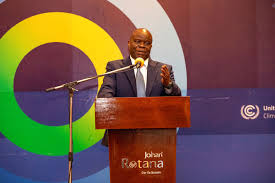African countries must invest in stronger digital infrastructure to fully harness the power of Artificial Intelligence (AI) in the fight against climate change, experts have said.
The call was made yesterday during a panel discussion titled “Powering AI for Climate Action: The Infrastructure Imperative” at the UNFCCC Technology Executive Committee’s AI for Climate Action Forum 2025, held in Dar es Salaam.
Speaking during the forum, Dr. Richard Muyungi, Tanzania’s Presidential Adviser and Climate Change Envoy, and Chair of the African Group of Negotiators (AGN), said that while Africa has made progress in adopting digital tools, the continent still lacks the digital backbone required to drive large-scale AI solutions for climate monitoring, adaptation, and disaster response.
“AI can transform the way we predict droughts, manage floods, and support farmers with climate-smart data,” Dr. Muyungi said. “But without reliable internet, data centres, and power connectivity, these technologies will remain out of reach for millions of Africans.”
He added that for Africa to meet its Paris Agreement commitments and achieve sustainable development goals, there must be massive investment in digital infrastructure, particularly in data sharing platforms, satellite systems, and cloud computing facilities.
Other speakers at the forum noted that Africa faces a “data divide” that limits its ability to develop climate models and early warning systems. They stressed that while global AI systems are improving rapidly, most African nations lack the data capacity to contribute or benefit equally.
Ms. Amina Said, an AI researcher from Kenya’s Climate Innovation Centre, said that climate-focused AI depends heavily on high-quality local data.
“We cannot rely on imported data to solve African problems. We need African data, collected by Africans, processed in Africa,” she said. “This requires collaboration between governments, universities, and the private sector.”
The panel urged African governments to create enabling policies that attract private investment in digital and AI infrastructure. They also called for the inclusion of AI-for-climate projects in national budgets and public-private partnerships (PPPs) to ensure long-term sustainability.
Dr. Muyungi emphasized that integrating AI into climate policy and national planning could help countries better track emissions, protect biodiversity, and improve disaster preparedness.
“AI should not be seen as a luxury, but as a tool for survival in a changing climate,” he said.
Tanzania, which hosted the forum, is already making progress in expanding its digital capacity.
The government has launched several initiatives under the National ICT Broadband Backbone (NICTBB) to improve connectivity and support research in climate science and innovation.
Officials at the forum said such investments are key to positioning Tanzania and other African nations as regional leaders in AI-driven climate solutions.
The AI for Climate Action Forum 2025 brought together policymakers, scientists, and technology experts from over 40 countries to discuss how emerging technologies can accelerate global climate goals.
The meeting focused on the use of artificial intelligence, big data, and digital infrastructure to strengthen climate resilience in developing nations.



